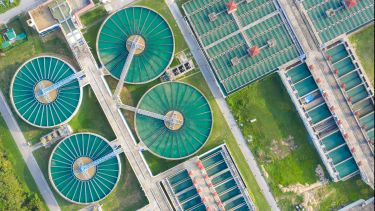Bio-engineering
Researching biological processes in urban water systems.

We seek to understand the presence, activity and impact of biological processes on the performance of urban water systems. Key research questions we ask are
- Who's there?
- What are they doing?
- What're the interactions between the physical, chemical and biological processes?
- What's their impact on the system performance, and wider environment and vice versa?
- How do we use this knowledge to engineer or control the biological processes to optimise performance?
By combining our strengths and research expertise of civil-, environmental engineers and molecular microbial ecologists with our internationally recognised facilities enables us to conduct research into biological processes from the molecular to the catchment scale, enabling cutting edge research to be explored and validated against current industry practice.
Four overarching themes guide this research
It is through engagement with all four of these themes that we create a well-rounded picture of biological processes in urban water systems.
Synthetic biology led solutions for urban water challenges
Synthetic biology is an emerging and exciting field, and offers highly adventurous and novel opportunities to develop new and innovated engineering solutions to urban water challenges. We are investigating the technical and social feasibility of developing synthetic biology led solutions within a framework of responsible innovation.
Biofilms
In order to understand, and ultimately engineer and control the process of biofilm formation, we take a combined approach that concurrently addresses the key (and interdependent) engineering, biological and biochemical questions surrounding cell adhesion and its impact on water quality and sewer network performance.
Microbiology in urban water systems
We use state of the art molecular microbiological techniques to link the abundance, diversity and activity of microorganisms to physical and engineering variables. This enables novel insights into the ecology of microorganisms within both water distribution systems and sewer networks to be investigated and provides the fundamental basis for monitoring and engineering of system performance.
Interactions
Many problems in urban water systems, for example, odour and corrosion are caused when physical, chemical and biological processes interact in the cycling of elements. We study these interactions to predict, prevent and treat these problems and maybe even turn them to our advantage.
Key people:
-
Catherine Biggs
- Henriette Jensen
-
Katherine Fish, Research Associate
Example projects
Pipe Dreams
The vision of this project is to transform the operation and management of buried water distribution system infrastructure, maximising performance to meet the combined impacts of climate change, increasing societal demands for water quantity and quality and changing population densities, ensuring the delivery of safe wholesome water for public health and well being throughout the 21st Century and beyond.
MUWS
Through the recruitment of 3 fellows, each specialising in a different type of microbiological technique and environmental application, the knowledge transfer in this programme allowed PWG to apply microbiological techniques in the context of urban water environments and to combine this new knowledge with existing field and laboratory-based studies.
